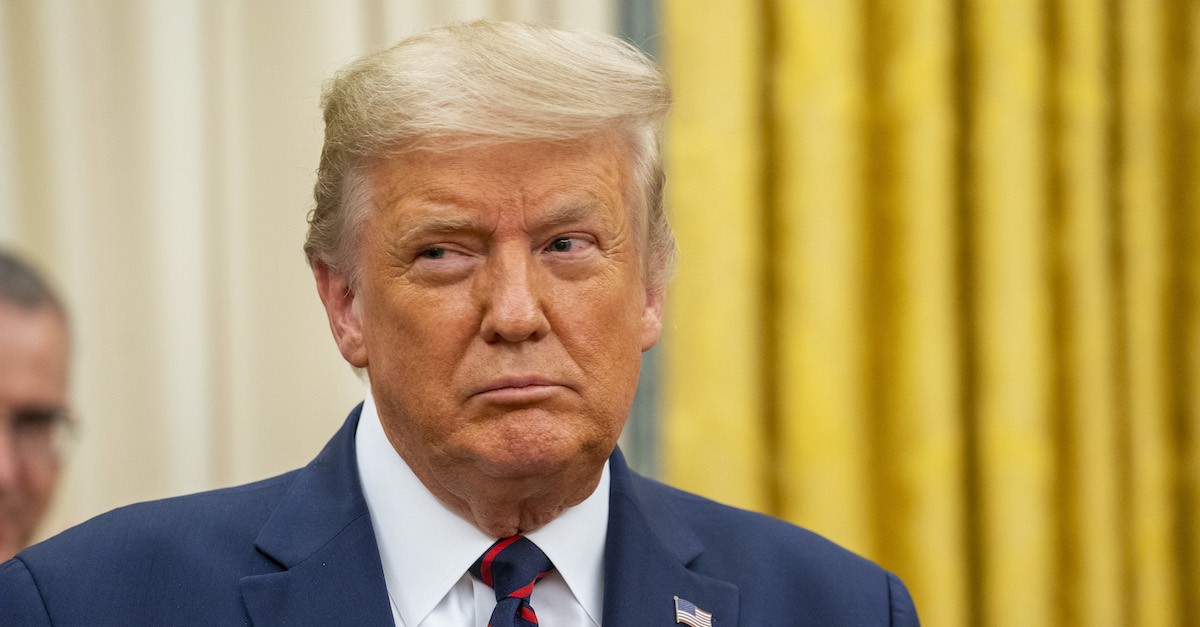
Former president Donald Trump is now a private citizen, a fact his defense team featured prominently on impeachment eve. Soon-to-be-tried by the U.S. Senate, “Citizen Trump” filed his impeachment trial memorandum on Monday, opening with an invocation of the phenomenon known as “Trump Derangement Syndrome.”
“During the past four years, Democrat members of the United States House of Representatives have filed at least nine (9) resolutions to impeach Donald J. Trump, the 45th President of the United States, each containing charges more outlandish than the next,” the memo begins. “One might have been excused for thinking that the Democrats’ fevered hatred for Citizen Trump and their ‘Trump Derangement Syndrome’ would have broken by now, seeing as he is no longer the President, and yet for the second time in just over a year the United States Senate is preparing to sit as a Court of Impeachment, but this time over a private citizen who is a former President.”
The concept of “Trump Derangement Syndrome” is a pejorative meme that is used to refer to criticism of the previous administration and/or president which is perceived to be irrational. It has been the subject of numerous articles by CNN, Psychology Today, the Wall Street Journal, and more. There are entries for the term on both Urban Dictionary and Wikipedia. In general, the phrase is used by critics who aim to expose the alleged or apparent bias of any given criticism of Trump–but it has also been used to explore and expose alleged hypocrisy committed by the media and political class.
CNN’s own Fareed Zakaria, a prominent anti-Trump voice, writing in the Washington Post, once cautioned against succumbing to the syndrome by arguing that a Trump policy, just by virtue of its source, “cannot axiomatically be wrong, evil and dangerous.”
But regardless of the term’s widespread adoption, legal experts dismissed the utility of the reference in the 45th president’s 78-page defense memo.
“It’s an amateurish way to open a brief, using silly social media slogans imputing the opposition’s motivations,” CNN legal analyst Elie Honig told Law&Crime.
The heart of the argument advanced by the defense memo is that Trump is protected from impeachment by virtue of jurisdiction since he’s no longer the president. Invoking ‘Trump Derangement Syndrome’ would seem to be a shorthand way to suggest that congressional Democrats are acting irrationally and ignoring the U.S. Constitution.
“In this Country, the Constitution–not a political party and not politicians–reigns supreme,” the introduction continues. “But through this latest Article of Impeachment now before the Senate, Democrat politicians seek to carve out a mechanism by which they can silence a political opponent and a minority party. The Senate must summarily reject this brazen political act.”
That expanded argument fared no better among legal experts.
“The Constitution is indeed the supreme law of the land, and when a President violates his oath to it it’s entirely constitutional to put him on trial for it,” federal criminal defense attorney Tor Ekeland told Law&Crime. “Just like one’s criminal or civil liability doesn’t depend on whether one works in the public or private sector, neither does Mr. Trump’s.”
National security attorney Bradley P. Moss drew a direct contrast between the language employed by the former president’s attorneys and the relatively more austere tone used by the Democratic Party in the U.S. House of Representatives’ trial brief.
“The two sides’ briefs could not be more distinct in their approach: the House Managers’ brief was about the law and facts, whereas Mr. Trump’s legal team plays on political hyperbole and overblown rhetoric designed to please a party of one,” Moss said in an email. “If this were an actual trial in a court of law, as opposed to a political circus, there’d be no contest in terms of how much more weight the House Managers’ brief would hold.”
As Law&Crime has noted many times in the past, impeachment is not a court of law. Rather, it is a constitutional process that takes on many visual trappings of law due to traditions, norms and mores. Impeachment is, in fact, much more akin to a political circus—and the arguments advanced only need to be accepted by other political actors, the 100 members of the Senate. And, for Trump’s purposes, he only needs to convince 34 of his fellow party members that his logic is more sound than that of their shared rivals.
[image via Doug Mills/Pool/Getty Images]